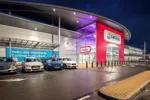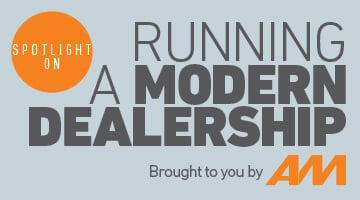1: Staff culture
Ensuring employees are environmentally – and cost – conscious must be the simplest step. AM100 dealer group JCT600 began energy awareness training about five years ago, holding hour-long sessions for groups of about 15 staff at a time. Its property director, Mark Taylor, said: “We aimed to cut 10% from our annual power bill, and achieved our target, and I think much of the success was down to making everything feel personal.
“Instead of talking about energy efficiency at the corporate level, the first half of every session was about individuals and household bills. We asked how much people spent on energy, how often they switched providers and if they’d thought about how to make savings. You could see the messages really got across.
“Then we shifted the focus to ways of saving energy at work, always making sure to turn off the lights and the PCs. All simple stuff, but it really had a clear bottom-line benefit, and at no cost to us.”
Since then, JCT600 has gone further, installing solar panels on six dealerships, and working with Leeds-based Smart Buildings to install wireless dashboards from which it can monitor every aspect of energy use, from electricity and water to air conditioning.
“Typically, they cost around £30,000, but at our largest site in Sheffield, the payback was less than a year. The systems are also tamper-proof, so if one showroom’s lights were on at 1am, we’d get an automatic mail at head office.
“We also have league tables to show how much energy each site uses, so we can judge the impact of the new systems and of how staff are continuing to implement energy-saving methods,” said Taylor.
2: Energy audits
Darren Williams, a former Seat dealer now turned automotive management consultant at Elements PRMC, says energy audits are rare.
“There are exceptions, but not many. Toyota, for example, asks its dealers to complete a simple quarterly audit detailing what they’ve done to reduce energy use. So when a brand gives its dealers a bit of a prompt, they respond, but that’s the first time I’ve seen a manufacturer acting in that way.”
Williams has just been commissioned by AM100 dealer Jardine Motors Group to look at its energy consumption, and consider such potential investments as LED lighting and energy-reflective glass.
“To be honest, I’m always surprised energy consultants aren’t more pro-active, and don’t seem to visit dealerships offering free energy audits and suggesting energy-saving products, in the way that companies used to do with loft insulation,” he said.
“Even for major dealerships though, these measures represent a significant investment, so over the years, people have just ignored the fact that their showrooms are often too warm in summer and too cold in winter.”
Williams is aware of the financial challenges dealerships face when ‘green’ issues are on the agenda. The fact that a franchise contract is for two to five years makes it a complex decision when major energy-efficiency projects may take that long or longer to repay their investment.
3: Transport
Darren Williams also thinks dealers could be more innovative in their use of courtesy cars, whose numbers are typically set by manufacturers, rather than as a considered element within a dealership’s operational strategy.
“Manufacturers usually set a ratio between the number of your technicians and the size of your fleet of courtesy cars, so if you have 15 technicians, you might well have seven or eight courtesy cars, but many of them end up not being used efficiently,” he said.
Often customers take one merely to get home or to their workplace, however some dealers are combating this, instead giving customers lifts or offering collection and delivery. Volvo has been developing a service whereby the customer waits in a lounge while two technicians complete their annual service in about 27 minutes.
”Dealers tend to do what dealers have always done, without giving matters a great deal of thought, so if no one raises issues, such as the use of courtesy cars, nothing is going to change. Again, it’s an area where the manufacturers could do more to encourage change,” added Williams.
4: Go paperless
There has been much progress in replacing paper-based operating systems with integrated management systems, which cut costs, boost productivity and free up staff for front-line work.
At dealership management system (DMS) company CDK Global UK, managing director Neil Packham said technology is focusing on what makes dealerships operate better.
“Most dealers now understand the merit of the technology, but too often they fail to put the right processes in place, or engage fully with their staff so they know their precise role and responsibilities.”
Packham said one problem was many dealerships still operate in different ‘silos’, with different licences and contracts.
“We’ve been looking at how to break down those barriers and increase operational efficiency, and we’re about to launch a paperless enterprise resource planning system called DigiDoc.”
“It’s been designed for the automotive industry, and it creates digital deal files, then links into the invoice system and stores everything in the cloud.”
A further benefit of cloud-based software is that they dealers don’t need air-conditioned servers rooms on-site.
5: Waste recycling
Richard Brown, who built the motor division of waste management firm SWR into a £6.5 million turnover business before establishing Rose Hill Consulting, suggests manufacturers need to impress sustainability onto their networks.
“Manufacturers go to enormous lengths to stress their commitment to improving the environment, but then look the other way when it comes to issues about waste or recycling at dealers. They think ‘talking green’ is a strong marketing tool, but then don’t commit themselves to building sustainability measures into their dealership operating standards.”
He fears that until manufacturers highlight challenges such as a dealership’s carbon footprint or its recycling ratio, little will change. Currently the costs are not high enough to drive change – Brown said waste represents 0.5% of a dealership’s operating expenses. Yet he is optimistic that the drive to encourage consumers into electric cars may create momentum that rubs off on the ways dealerships operate.
“Traditionally, dealerships face their defining pressures from manufacturers and customers. They will react to them.”













Login to comment
Comments
No comments have been made yet.